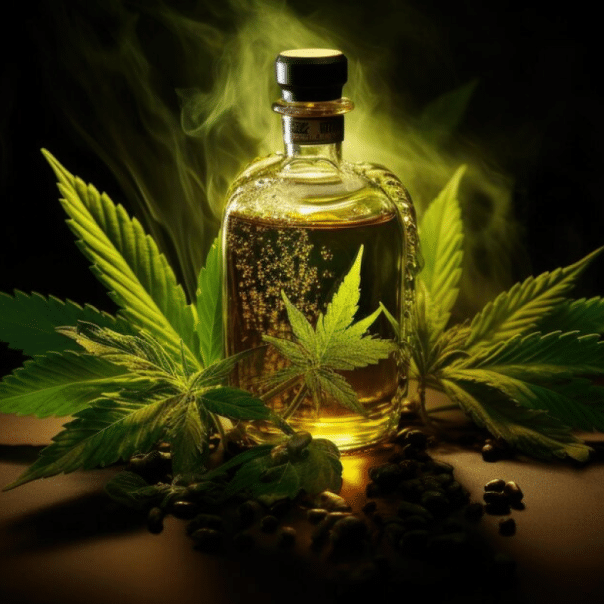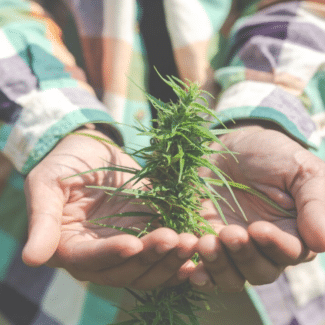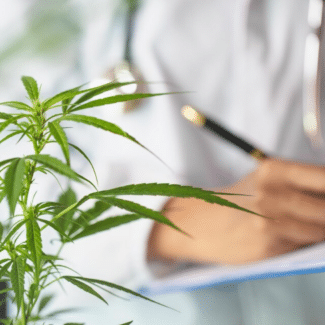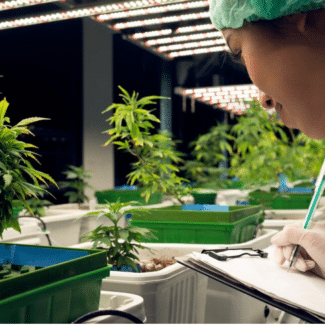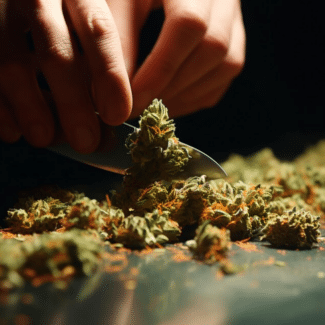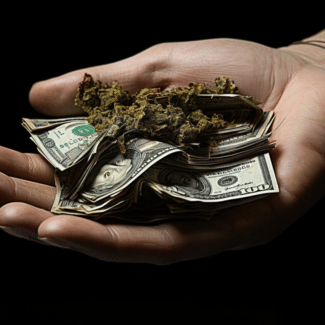The effects of cannabis are multi-faceted and complex, and this ancient plant cannot be boiled down to a particular strain or THC level. Yet in today’s cannabis marketplace, it seems the only thing people care about is potency or high THC percentages. Chasing higher and higher levels of potency has become an obsession in the cannabis industry, with growers, budtenders, and consumers alike in pursuit of the next highest thc strain.
This focus on a sole molecule is problematic for the industry for a number of reasons, not the least of which is that cannabis deserves to be known for more than one cannabinoid. But another issue with this pursuit of high thc strains is the impact it has on consumers, and how it skews the risk of cannabis use. These issues are front of mind for insurance companies and businesses seeking to develop fair and effective drug testing policies.
THC Explained
THC is shorthand for delta-9 tetrahydrocannabinol and it is without a doubt the most famous component of the cannabis plant. THC is the major psychoactive compound in commercially cultivated cannabis and is usually what new consumers use as a measuring stick for trying new products. Whether you’re looking for indica strains or sativa strains, today you can find increasingly high thc levels on the market.
Ancient cannabis plants had comparatively low levels of THC; CBD was far more abundant in ancient marijuana strains, as were more minor cannabinoids and a plethora of chemical compounds. All of these chemicals play an important role in the entourage effect — not just the THC level.
But today’s cannabis plants bear little chemical resemblance to their ancient forebears since prohibition caused decades of high THC potency-focused cultivation. Contrary to popular belief, cannabis products are not better simply because they’re more potent — there’s a lot more to cannabis than just a high THC strain.
How THC Potent Strains Have Become an Obsession
During the dark days of prohibition, marijuana potency was the only thing people had. Robust lab testing is still scarce in developed adult-use markets and wasn’t even in the wildest dreams of legacy cannabis consumers. When you could only buy weed a dime bag or two at a time (on a dark corner, no doubt) you wanted the weed to work effectively so you could stretch your stash as far as possible, so you wanted a potent strain. The result today is the strongest strains with the highest THC content levels in human history.
But there is so much more to cannabis than just the THC percentage and the focus on THC potency has gotten out of control. The average THC level of marijuana strains has continually gone up over the last decade. High-potency THC products are associated with a higher risk of adverse side effects like anxiety, paranoia, vomiting, headaches, decreased mental health, and increased blood pressure. High potency strains can exacerbate existing medical conditions and in some rare cases, even trigger a psychotic disorder.
150 mg edible won’t just send you to the moon — it may make you feel trapped there. Today’s legal marketplace features some of the strongest weed strains ever — and that’s not necessarily a good thing.
But for better or worse, marijuana users want higher THC products. This is evidenced in the potency of popular strains, as well as the high thc content of concentrates, and edibles. Consumers (incorrectly) believe higher potency means the products will work better and they’re willing to pay more for them.
And when businesses can’t grow products that meet this demand, they may take another tactic – inflating the test results. Lab shopping, or the phenomenon of businesses seeking labs that will produce artificially potent THC levels, has increased to previously unseen levels in the past few years. There are a few different ways labs can achieve this, all to the detriment of the consumer.
How Varying THC Levels Impact People and Treat Issues
THC is the main cannabinoid in commercially cultivated cannabis and is responsible for the psychoactive effects that makes people feel “high.” This feeling is due to the interaction of the THC molecule with your endocannabinoid system (ECS).
Your endocannabinoid system is a master regulatory system, touching on nearly all biological functions. But the ECS has a twist — it’s unique to each individual person. This individuality is why people react so differently to the same cannabis products. Your ECS determines how you react to THC, along with the dose of THC, the method of consumption, and a few other factors.
Everyone has a different THC tolerance — but most people’s tolerance is lower than they may think. Your ECS is easily overwhelmed by THC and potent marijuana strains can produce intense and longer-lasting effects. Potent products are often linked with a higher risk of negative side effects, especially when the THC is in isolation, like a concentrate or an extract in an edible. Seeking the highest thc strains possible doesn’t mean a cannabis product will work better, just more intensely.
This isn’t to say that high THC potency doesn’t have a place in the market — it does. High THC products have been historically used for cancer patients and other people with serious illnesses to combat intractable wasting, deal with chronic pain, give patients an appetite, and even combat seizures. There is a time and a place for every weed strain — but a high THC strain certainly doesn’t work for every consumer.
How the Obsession With High THC Strains Impacts Consumers and Cannabis Companies
There’s a lot of misinformation for a new cannabis consumer to comb through, and the easiest place to start is usually with the THC potency. However, this obsession with high THC strains can lead consumers to try products that are too strong for them and give them a negative experience. At best you’ll have a bad few hours, but at worst it can lead to a hospital visit and turn someone off of cannabis entirely. That’s certainly not the affiliation the cannabis industry wants to give potential consumers.
The obsession with high THC strains is bad for businesses, too. Companies can feel pressured to produce high-THC products simply because of their popularity — not because they’re safe or effective for consumers. Brands may feel increased competition from companies that inflate their THC results and fear they may be overlooked on the dispensary shelf if the THC levels are too low.
This obsession can also stunt the development of new cannabis products. keeping the focus on those that are specifically designed to be as potent as possible, rather than developing weed strains with varying levels of potency. This isn’t an issue isolated to indica strains or sativa strains — every product deals with this.
An unrelenting focus on potent strains may create new risks for consumers, like:
- Increased risk of adverse reactions
- Difficulty finding accurate information about product potency
- Lack of transparency about lab testing practices
And of course, the risk of lab shopping carries a risk of being found out. If a brand is revealed to be artificially inflating the THC potency of a marijuana strain on its COA, it could lead to damaging the brand’s reputation, loss of consumer trust, decreased sales, and even legal liability.
How THC Potency Might Inform the Future of Drug Testing for Employers
Potent THC products don’t just pose a problem to growers and consumers — they also pose a problem for employers. It’s increasingly common for people in legal states to partake in marijuana use — but this can present an issue at work.
Traditional drug tests look for the presence of THC in a person’s system, not necessarily intoxication. This is a problematic way for testing since even a single, small dose of THC and its metabolites can last for days. If someone smokes a bowl on Sunday, it will still show up on their drug test on Thursday — even though they’re not still high.
This is because THC is lipophilic, which means it’s a fat-loving molecule. It takes up residence in your body’s fat stores, which is why it takes so long to be processed out of your system, and why you can test positive for THC days after you consume it.
This method of testing has been outcried by cannabis users in legal states, but the increased popularity of high-potency products begs the question again — how can drug tests be more focused on testing for THC-based impairment, rather than just the presence?
Testing for THC impairment is complicated. With alcohol, a breathalyzer can tell you how much alcohol is in someone’s system, which gives you a baseline for impairment. But cannabis doesn’t work the same way. Impairment testing is more complex and expensive, but it’s also a more fair and effective way to identify people under the influence of weed at work — not just those who toke in their off time.
Impairment at work is an insurance issue — but so is wrongful termination. In 2022, a woman in Pennslyvania won her wrongful termination suit against her employer who fired her for having THC in her system, despite holding a medical marijuana card. The development of new and better drug tests that can more accurately assess timely impairment could have prevented this lawsuit.
THC Potency Through a Risk Management Lens
THC potency is a complex issue. There is no good “barrier” or level to cap THC products at because everyone’s endocannabinoid system is different, and there are medical applications for THC products of all strengths. So companies and consumers are left to navigate the stormy shoes of potency without much guidance except trial and error.
Consumers want products that are safe and effective, and companies want to sell products that won’t have issues. The integrity of lab testing is paramount for this, and lab shopping completely undermines consumer trust in both brands and lab test results. Lab testing is one of the major differentiators for the legal market over the legacy market, and what good is that if consumers don’t believe the labs?
Having fair and firm drug testing policies can go a long way for internal company culture. Companies in legal and medical states can work with their insurance companies to create these policies, based on sound science — not propaganda. Companies should also consider investing in impairment-based testing methods rather than tests that look for the mere presence of THC.
The consumer focus on THC potency is, at its heart, an education issue. Consumers don’t know the intricacies of the plant — how could they with decades of information repressions? Cannabis insurance companies can help combat this, by working with cannabis companies to develop engaging, science-based education materials about the risks and benefits of increased potency at high and low levels. Cannabis insurance companies may also be able to help sway the tide by offering discounts or incentives to consumers who choose to use less potent products over the highest THC weed strains available.
Protecting your cannabis company can seem confusing; however, we’re a full-service insurance brokerage working with carriers worldwide to offer you the best coverage possible. We’re here to help! Please reach out to us today by emailing [email protected] or calling 646-854-1093 for a customized letter of commitment or learning more about your cannabis insurance options.
